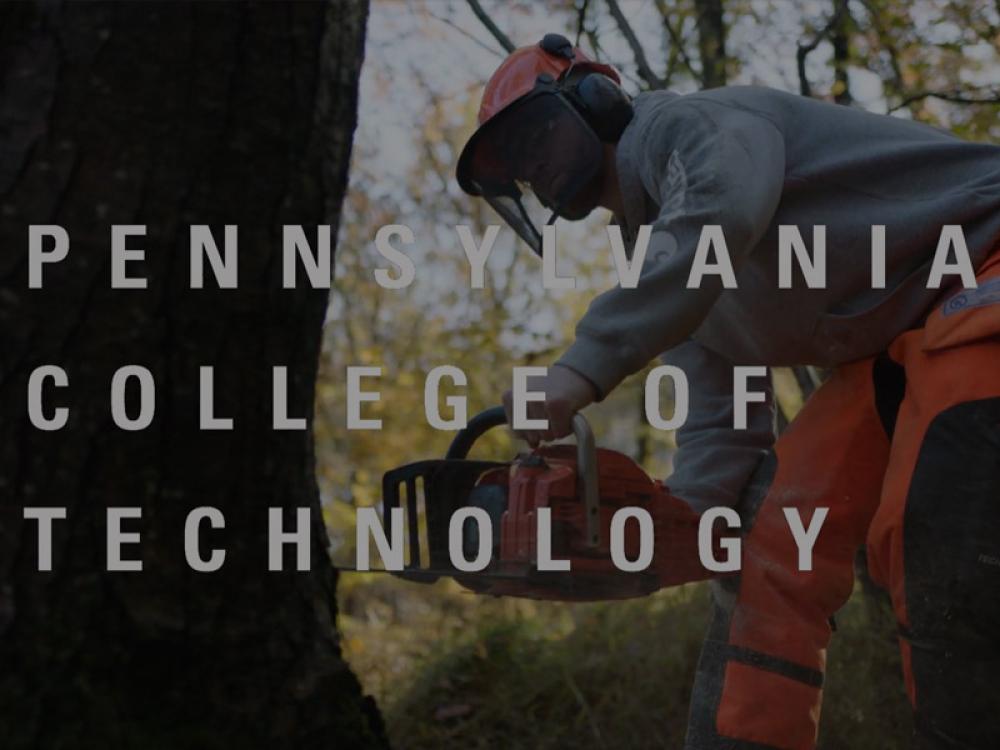Eric Easton
- Faculty
- Forestry
After earning his forestry degree, Eric set off to the Black Hills in South Dakota to work as a technician for the national forest service. From there he moved into a career with the Bureau of Indian Affairs where he tackled all kinds of exciting projects like creating timber maps for the Akwesasne reservation and conducting black ash studies for the Mohawk tribe. Now Eric’s back at his alma mater sharing his real-world experience with next-gen forestry professionals.

Leading the Way
Q&A with Eric
HOW DID YOUR PENN COLLEGE EDUCATION LAY THE GROUNDWORK FOR YOUR CAREER?
Completing my associate degree in the forestry program at Penn College allowed me to see a variety of different avenues to pursue in the field of forestry. We covered a myriad of topics in the forestry realm, from seedling propagation to timber harvesting and product creation and all points in between. The lab training that is associated with the lecture material made my experience at Penn College an invaluable asset as I moved forward with searching for my career. It allowed me to know more fully what I enjoyed and where my interest was found within the forest industry. I ultimately chose Forest Management as a path of focus because it allows me to interact with landowners, visit and assess all different types of landholdings, and be out in nature truly enjoying my work while earning a living.
THE EARTH SCIENCE CENTER INCLUDES A WORKING SAWMILL AND WOODLAND SURROUNDINGS. HOW DOES DIRECT ACCESS TO PENN'S WOODS BENEFIT STUDENTS?
Being able to showcase all aspects of the forest industry from boots-on-the-ground measurements and management on the college landholdings to harvesting a timber crop and producing a product, allows students to see – over the long term – the effects of different management strategies and to revisit the same site multiple times at varying stages of management. We are blessed to have multiple different landholdings that offer a wide variety of timber types and qualities that provide a great overview of different management strategies for our students.
WHAT IS THE SIGNIFICANCE OF OUR "TREE CAMPUS" DESIGNATION?
Our recognition as a national “Tree Campus” is important as we move toward the future. In both a landscape tree environment such as the Penn College main campus, and a naturally grown woodlot setting such as the Earth Science Center, a respect for trees and the benefits they provide is showcased. In my classes, we often discuss the most beneficial management strategies for our timber resource, and having a national "Tree Campus" designation supports the efforts that have been ongoing to provide care for not only individual trees, but also the forest as a whole. We are grateful to have this recognition of efforts made to keep all of our natural environments throughout campus healthy and productive.
DO YOU HAVE A FAVORITE COURSE AND WHY?
It may sound cliché, but I truly enjoy all of the courses that I teach, but if I had to choose one, I suppose it would be Forest Mensuration. This is our measurements course that allows us to determine baseline data for a forest or a timber stand in order to make sound management decisions moving forward. As with most things in life, including forest management, without knowing where you currently stand, it is impossible to figure out where you want to go or how to get there. This course also demands a large amount of time in the forest, which is where I feel truly comfortable.
HOW DO YOU STAY UP ON CURRENT TRENDS IN FORESTRY WHEN YOU'RE NOT TEACHING?
Outside of the school setting, I offer forest consulting advice to landowners, and this allows me to gain more experience and stay current in the industry. The joy that I get from being in the woods, and sharing my knowledge and experiences (both good and bad) with my students, is something I cherish and hope to continue for a long time.
HOW DO STUDENTS BENEFIT FROM INDUSTRY PARTNERSHIPS?
The forestry program recently received a donation of a new chipper from one our partners. It will allow our students to gain experience in the operation of an industrial chipper similar to those in the urban forestry field. And it will be featured in many of our classes as a tool to promote quality management and complete utilization of our forest resources, as the chips can be reused for trail maintenance within the outdoor laboratory at the Earth Science Center. Read more about this below.
Awards

Committed to responsible forest management
For the fifth consecutive year, Penn College earned the Tree Campus USA recognition by the Arbor Day Foundation for commitment to urban forestry. The Tree Campus USA program honors colleges and universities for effective campus forest management and for engaging staff and students in conservation goals.
Guaranteed Momentum

The benefits of industry support
Thanks to industry partnerships, like those with Bandit Industries, Inc., future forestry professionals get hands-on experience in the driver's seat of equipment just like they'll use in the real-world. As lead forestry faculty, Eric welcomed the recent donation knowing the value industry tools play in student training.
Programs
Forestry
Embrace hands-on learning and prepare for a sustaianable career.
All Programs
Unsure which major is right for you? See all academic programs at-a-glance.

